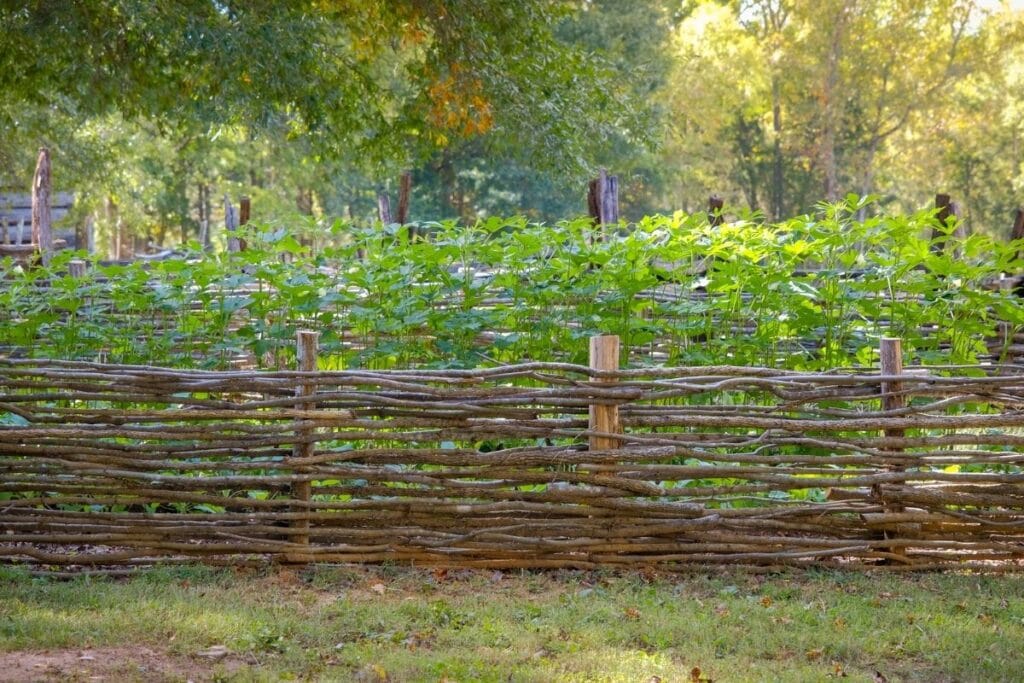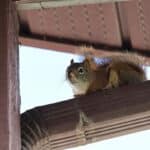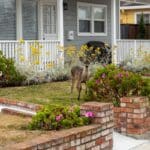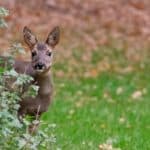Want to learn how to keep animals out of the garden? You’re in the right place.
Seeing wildlife in your backyard can be a great sight to see, but it can come at the expense of your beautiful garden. Animals will frequent yards that provide good amounts of food and shelter, like the tasty vegetables in your raised beds. Don’t worry, there are great deterrent methods to try.
Suppose you notice various animals visiting your yard and destroying your garden. In that case, you might want to either reevaluate your landscape or practice varying deterrent methods ranging from offensive scents for the animals, removing possible shelters, and different kinds of fencing.
We have compiled a guide to some of the best deterrent methods for keeping animals out of your entire garden. Let’s take a look at some ways to keep animals out of your yard.
What Attracts Animals to the Garden?
Wildlife varies depending on the region you live in, but one trait remains the same: most wildlife are attracted to areas that cater to their desired living conditions. Here are some environments that attract wildlife to your garden.
Food & Shelter
The number one thing that animals will search for is food and shelter, especially during harsh weather. Your yard might host plentiful alternative food sources and ample opportunities for these animals to take shelter.
Unfortunately, your lovely fruit and vegetable gardens invite all kinds of wildlife. They seek the nutrients and hydration of these food items especially if it is during a dry season or when food is scarce in the winter.
Further, if you have unlocked sheds, overgrown shrubs, or trees that provide a good amount of protection, all kinds of wildlife will most likely seek out your yard for that shelter.
Overgrowth
If you like a more natural look to your yard and garden, you might allow for a few plants, bushes, shrubs, and trees to grow a little wilder. This is great for aesthetics, but it will also attract wildlife.
Allowing your yard to overgrow by not pruning as often, mowing as often, etc. will provide more food sources and shelter for all kinds of wildlife. In addition, a biodiverse landscape closely mimics what these animals would experience in their own “homes.”
Trees & Shrubs
As stated previously, trees and shrubs provide good shelter from harsh weather but they have other functions for wildlife as well.
For example, growing a good amount of trees and shrubs dampens human noise and blocks artificial light sources. Less human noise and lights lead the animals to believe the area is safe to sleep and eat in.
Some fruit trees provide food for certain garden pests. For example, we explained this in our article on protecting fruit trees from squirrels.
Water Source
If you have a fountain in your yard, a leaky hose, and even a pool, animals will most likely venture onto your property for a drink.
Animals will be seeking out water sources more often in the dry, hot months.
Bird Feeders
Do you like bird watching in your backyard? If you do, you might have a few bird feeders up to help feed the bird population in your area.
The seed in these feeds not only attracts birds but other wildlife as well.
Flowers
Most wildflower species provide adequate food for most wildlife. Further, a lot of other flowers function similarly.
Granted, there are certain flower species (primarily with strong scents) that can deter animals. However, if your backyard has a lot of flowers native to the area, animals will want to come to take a nibble of it.
How Do I Keep Animals From Eating My Plants?
If you have one or more of the above items in your yard, no need to worry! You can still enjoy your landscape with a few maintenance and preventative measures.
The big takeaway from this portion is to keep these methods close to your garden. If the animals are hungry enough, they will try to find a way around these deterrents.
Placing an animal repellent for garden close to and throughout your garden will most likely be effective in keeping animals away.
Offensive Scents
Animals typically have more smell receptors than humans. In other words, scents that may be pleasant to us might be too intense for an animal’s nose.
Plants & Herbs
Plants such as lavender, chives, sage, daylilies, balloon flowers, and marigolds are just a few examples of garden plants you can grow to help deter animals.
Vinegar
Additionally, you can use vinegar. Vinegar’s acidic properties are extremely offensive to animals. You can dilute vinegar in a spray bottle and spray it around your garden. Or, you can set out small bowls of vinegar close to the plant or areas most desirable for animals.
Coffee Grounds
Coffee grounds work in a similar way that their bitterness will often deter animal pests. If you plan on using the method of offensive aromas, keep in mind that you will have to replace these properties after heavy rain to keep the smell present.
Hot Peppers
You can also use hot peppers to keep animals out. You can either puree the peppers, dilute them with water, and put it in a spray bottle or you can set whole peppers/flakes out around your yard.
Animal Scents
Predator urine is among one of the strongest deterrents you can purchase. One whiff of coyote urine and most animals will go running.
Similarly, blood meal works great as well. Since blood meal is composed of dried animal blood, the smell will send already skittish animals in the other direction.
Human Hair
If you have extra hair in your hairbrush you need to get rid of, try sprinkling it around your yard instead of throwing it out.
Most animals will steer clear of humans. However, if the wildlife in your area is used to human interaction, you might want to try some of the other scents listed above.
Castor Oil
Castor oil has very strong properties that we may use for a pleasant aroma in our soaps or lotions, but it is unpleasant for many animals.
Fences
Fences are among the most effective physical barrier methods for keeping animals out. You can choose from a variety of materials to build your defensive line. These materials can be wood, wire, mesh, etc.
The trick is to build a fence 6 feet tall, high enough (a lot of small animals can climb) and opaque enough so larger animals can’t see through into your garden. Chicken wire mesh seems to be among the most popular materials, but you can customize your fencing according to your tastes and functionality.
Plant a Separate Garden
Feeding wildlife can be fun when they aren’t consuming your garden. If you’d like to provide substance for the wildlife in your area, you can consider planting their separate garden well away from your own.
When you do plant that personal garden for animals, we recommend using a combination of the preventative measures listed here on your garden. That way, the animals will figure out which garden is for them.
For example, try building a fence around your garden and leaving the animal’s garden exposed.
How to Keep Animals Away From Garden Without a Fence
No worries if you don’t want a big fence blocking off your yard! There are plenty of other preventative measures that help deter animals.
Sensory Preventative Measures
Most of the animals that will venture into your yard will be a bit shy. You can take advantage of this by using different mechanisms to scare them away from your yard.
Motion-Activated Sprinklers
Humans and animals alike typically don’t like to be surprised by a spray of water. Motion-activated sprinklers will help prevent animals from walking in your area if they don’t want to get wet.
Flashing Lights
This mechanism is great for nighttime visitors. Most of these flashing light deterrents mimic a predator’s eyes. They flash red when an object or animal comes within range.
Sound Triggers
There are automatic sound machines and traps you can set yourself.
If you would like to make “sound traps” yourself, you’ll want to string together bells, glass bottles, or other objects that make a good amount of sound when disturbed. You can study where animals frequent in your yard and position triggers to go off when crossed.
Fake Predators
For smaller animals, purchasing a plastic owl, fox, coyote, etc. will ward them off. However, you’ll want to reposition these fake predators every month or so. Other animals are smarter than we think, and they will figure out these predators are fake if they stay stationary for a long time.
Homemade Spray to Keep Animals Out of Garden
Most of these homemade sprays will involve hot sauce or vinegar. Both of these materials are incredibly strong, and animals hate them.
For hot sauce, you can take a few drops of hot sauce, a cup of water, and a few drops of dish soap to create a good liquid to spray around your garden. You can even spray this concoction directly on your garden. That being said, make sure to wash them before eating!
If you are planning to use vinegar, you can mix equal parts vinegar with water to put into a spray bottle.
Netting to Keep Animals Out of Garden
Bird netting and mesh netting are your best friends! This material can be laid directly over your garden without jeopardizing the health and integrity of the plant.
The material of this netting is sometimes too complicated for animals to work around, so they will eventually give up trying to get under the net.
However, we advise you to secure the netting by burying it under the soil around your garden. This way, animals won’t try to lift it and go under it.
What Can I Put Around My Garden to Keep Animals Out?
When protecting your garden, think of it as planning lines of defense that the animals have to confront.
For example, you can plant a border of marigolds or other detestable plants to discourage them from traveling past that border.
In addition, spraying that hot sauce or vinegar mixture outside and inside of your garden will make the animal’s noses turn up.
You can also put those mechanical deterrents outside of the garden to scare these flying pests away.
How Do I Keep Critters Out of My Vegetable Garden?
When safely keeping animals away from your garden, remember to take advantage of strong-smelling plants or food items in addition to building a fence. Both of these methods, especially when practiced together, are incredibly effective.
If you don’t want to build a fence, try bird netting in addition to sensory deterrents or offensive scents.
FAQs
What scent will keep animals away?
Animals can be deterred by various scents, including strong-smelling herbs like lavender, rosemary, mint, or thyme. Additionally, citrus scents from orange, lemon, or lime peels can be effective in repelling animals. Predator urine, such as that of coyotes or foxes, can also act as a deterrent for some animals.
What is the best natural animal repellent?
One of the best natural animal repellents is a mixture of garlic and chili pepper. This combination creates a potent scent and taste that many animals find unpleasant.
Does vinegar keep animals away?
Vinegar can be effective in keeping certain animals away due to its strong odor. Diluted vinegar sprayed around the perimeter of garden beds or on plants can deter animals like rabbits, deer, and cats. However, its effectiveness may vary depending on the animal species and their sensitivity to the scent.
Before trying any of these methods, study the animals that venture into your yard for a few days. What foot patterns do they take? What areas of your yard do they favor?
After you’ve conducted your analysis, try out one or multiple of the deterrent methods we’ve covered.
Check more specific guides on how to keep squirrels, rabbits, deer, birds, cats, dogs, raccoons, chicken, chipmunks, moles, slugs, rats and groundhogs out of your garden.
*image by MarkCastiglia/depositphotos







